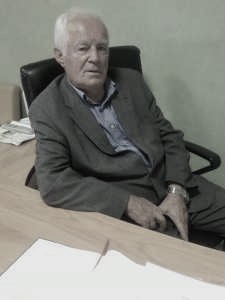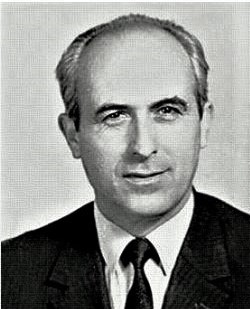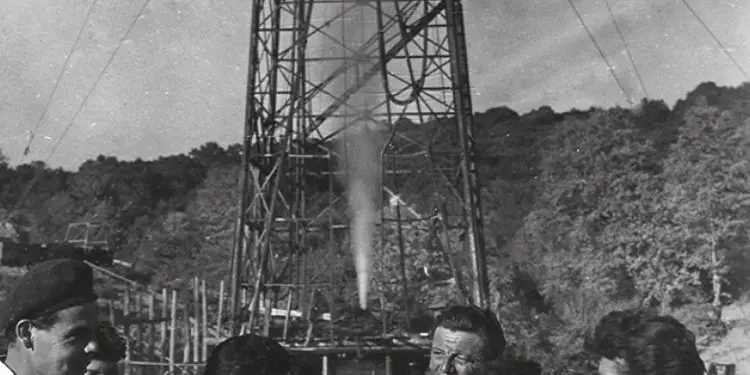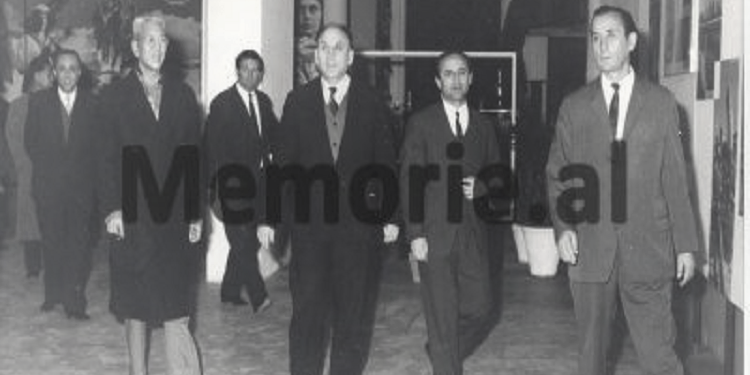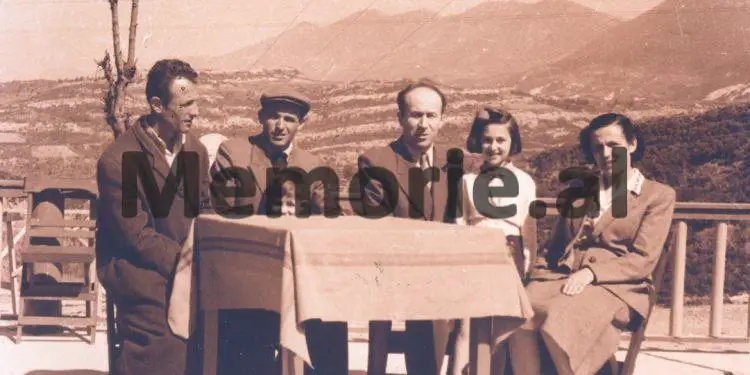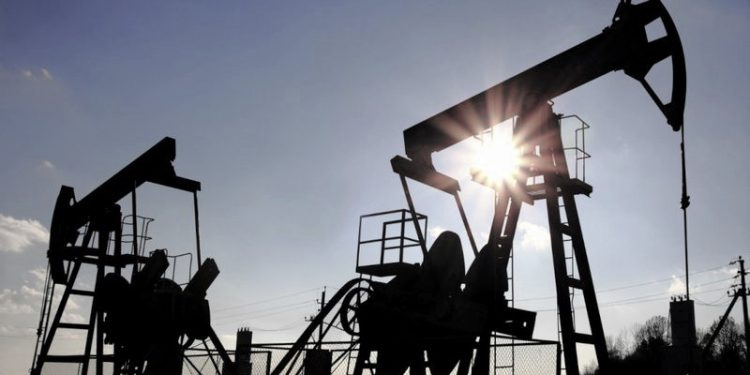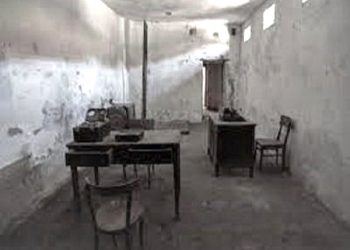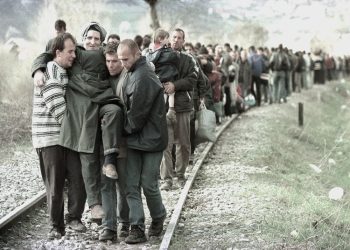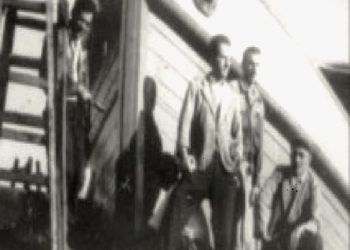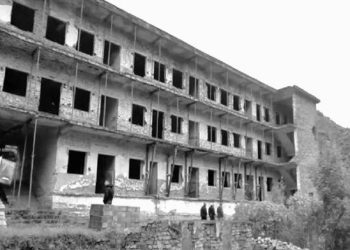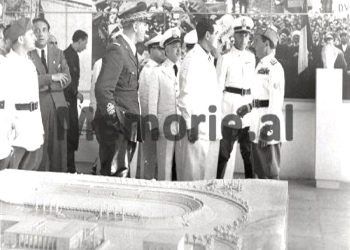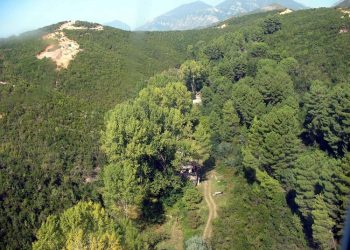By Petraq Xhaçka
The tenth part
Memorie.al / The purpose of this book is to join the efforts made to present the truths and horrors of the communist dictatorship in Albania. The main purpose of the book is not to show our people or anyone else, that we oilmen have been innocent, because this has become known from publications in our press, from foreign televisions, as well as from direct meetings with the International Forum and the Albanian Human Rights. The author’s desire, is that through this story, together with other stories, fight any manifestation in any form, even moderate, that he may have to create a communist society. I think that even through this bitter personal history, the cruel, treacherous and overbearing face of Enverism will appear, that for half a century, held the knife with the tip in the chest of the Albanian people, with a pine eye, intercepting the movements for salvation from the outside, or rebellion of the people themselves, ready to push the knife to the heart, at the first movement. The events have been set in the economic fields where it has appeared most strongly, such as the oil and gas industry, where I was fortunate to pour my energies, for a lifetime, and become a participant and witness in those events. All the events that are written in this memoir are true, not only without any exaggeration or embellishment, but perhaps, I don’t know how much I was able to present the terrifying force of the events that took place in that decadent system of socialism, where no there was no human feeling.
Continues from last issue
Later, in 1973, I was transferred to the Oil Institute, as deputy director for the scientific sector of oil extraction in Patos. There I generally found a very good collective and extensive scientific work was carried out. As you can see, in this period, my movements among tasks became frequent, by the nomenclature bodies, without asking me at all.
In 1973, geologist Nuredin Skrapari, one of the geological research and survey specialists in Kuçovo, was arrested for politics, for the reason that in one night, together with two other senior specialists, after they had gathered and drank, they were shot in the form of dissatisfaction and protest, the portrait of the dictator, for the closed life of the youth in our country, breaking and tearing it.
This young man, a senior specialist, spent about fifteen years in prison for this act. This news greatly disturbed his work colleagues at the Institute and in the enterprise, it influenced the senior specialists and technicians to live and work under a tension and a fear for the future.
From the beginning of the 70s, in the region of Saranda, from the first wells, some positive results were obtained, but with very small amounts of oil and gas. In fact, some mistakes were made there, because the conclusions reached were overestimated and many wells were designed for exploitation, without having an approved scientific and technical project.
Likewise, some other surface works, more extensive than what should have been done, began to be carried out, in connection with the beginning of the construction of the underground reservoirs. The euphoria pushed those responsible in the field and at the Institute to overestimate the amount of oil and gas reserves in it.
– Since I worked in the scientific sector of drilling in Patos, I was able to relate to a certain degree with the data of this deposit and concluded together with other specialists, that the preliminary calculations of the reserves made by the geology sector of the Institute of Oil, were not well argued and higher than the real possibilities. Technically and economically, as a result, without knowing the bedding well, it was not necessary to drill intensively in that object.
The thoughts I presented to the General Directorate made them send me to Saranda, together with two extraction specialists, N. Shehu and M. Bano. We were required to closely study concrete data and present our opinions. After about two months of study work, we reached our conclusions and I prepared to report. At the meeting of the directorate of the Saranda enterprise, which had been established for a while, the deputy prime minister at the time, Adil Çarçani, came to familiarize himself with the state of the works.
After being reported on the state of the works by other leaders, I was finally asked to report on the team’s conclusions. I reported the opinion that the reserves known up to that stage were much smaller than those estimated and as a result, the number of probes that would start drilling and the volume of surface plant works had to be reduced. The deputy prime minister, after listening to me, said:
– With this assessment that you presented to us here, Xhaçka, about the size of Saranda’s source-site reserves and the measures that must be taken to reduce investments, you put a rope in our throats.
I was forced to explain in more detail the technical situation of reserve calculations and that in this situation, it was necessary to greatly reduce the investments started and those that were thought to be made, because they would be unjustifiable and burden the economy.
– It is better and fairer to say things now, when very large investments have not yet been made, than to leave them for later, when they can no longer be corrected. Oil executives and government bosses, considering our opinions right, gave orders to stop some works that had started.
The plan made, for an intensification of drilling for the extraction of oil there, would be abandoned. This was an extremely large contribution that I, along with several other employees, were making to the economy at the right time, without allowing excessive expenditures to be made, from those that had been made.
My opinion was that this was simply an error in the estimation of geological reserves, made without malicious intent by the geological sector of the Institute, as well as by its directorate, and it came from the lack of experience in the field of reserve calculations, by geological employees of research, for limestone formations and it would be good then, for this work to be assigned to the scientific sector of oil extraction. However, again the situation was quickly grasped by us and life, even later, showed that our judgments and calculations were right.
With this step, we did not allow very large expenses to be carried out in this area, which did not promise to be economically justified, showing once again my seriousness and honesty, and that of the colleagues who worked on this problem. This case was enough, but in fact my whole life was filled with such cases, which shows that I never had the thought of sabotage, because if I had, in the events of Saranda, I would have remained silent and watching
I had no responsibility for the works that were being carried out, but it was my clear conscience towards the people of my country that did not allow me to remain indifferent, while great values of money were at stake, which would be wasted without effectiveness.
During these times, especially during the second half of 1974, numerous meetings were held and several working groups were organized, in terms of oil production planning for the five-year period 1975-’80. The leadership of the party had put forth its request that the oil planning for that period be of a higher level, reaching the figure of 3 million tons per year. In order to reach this figure, technically, more than one important new oil source should have been discovered every year, which for our conditions was completely impossible.
In addition, in order to reach such a level in 1976, it was necessary that, practically, two new oil sources had been discovered and these were in an advanced stage of exploitation and recognition, which in reality did not exist. Time, absolutely, did not allow capturing such levels. These were nothing else, just absurd planning, and bluffs, just for propaganda, in the form of fireworks, for the next party congress.
It was easy for the high leadership of the state to justify this non-realization in the future, with another group of saboteurs. Just as bicycles were easily produced in a factory, it was just as easy for the dictatorship to “manufacture” that “hostile group” of innocent people. At that time, the term “disabled” was almost entirely out of use. From that time onwards, in the oil sector in Albania, we would not have incompetents, we would only have enemies! Shocking madness! The great feudal lords did not worry about the lives of slaves and their slave families.
Enterprise plans were at lower levels because the sites were in the stages of production decline rather than growth. This situation brought great debates between the central bodies and the management cadres of the enterprises. The latter persisted at levels over thirty percent lower than those of the center.
As always in these debates, some employees raised their heads because of conformity with the state leadership, they supported the high figures, and secondly, because they did not bear any responsibility for the non-realization of the oil production plans. As a whole, most of the specialists and leaders, who were directly involved in oil exploration or extraction, were for realistic planning, that is, at much lower levels.
This right and principled position, I have also maintained during these extremely long discussions and full of nervous tension, due to the politicization of this problem, by the state pyramid. I had strong objections with Abdyl Këllez, the former Chairman of the State Plan Commission, and with Minister Koço Theodhosi. Both of them were members of the Political Bureau of the party and had to defend the high numbers, but as far as I understood, they themselves had reservations and understood that their demands were too high and scientifically unsubstantiated.
But even they were surely put in difficult conditions, towards the One of the state. Through the party’s materials, which came to us for information on economic issues, it was clearly understood that it was Enveri who set these impossible tasks. It was not difficult to understand in some important meetings that the ministers themselves, who were directly dealing with the economy and were responsible for the realization of the plans, had a great fear and repression.
While other members of the central apparatus of the party, who were responsible for other spheres of life, fiercely fought their colleagues and zealously supported the inflated plans or assessments made by the dictator, for every problem. Such scandalous scenes have become known to the public, especially in recent years, during democratic developments.
In the oil sector, there were many cases when the Political Bureau disagreed with the decisions of the Ministry of Oil or the Government, especially in the drafting of state plans for oil, gas and the level of footage of research and reserves that were expected to be and others were discovered.
My matches in debates with party leaders and members of the government became known to the extent of other specialists and they expressed their approval for these positions. But I am convinced that on the other hand, there were individuals of a different type, from those who participated in these meetings, without mixing in the debates. They kept notes, with which they probably informed the Security staff.
The latter happily filled the files with all kinds of data and used them as needed. For them, it did not matter how accurate and correct the information was. They collected the pros and cons. It was enough that the oil production plans were attacked as inflated, supported and defended as real.
Falsification, misinterpretation of reality, was a common thing in their work, because they never gave an account for the accuracy of the data. Likewise, the justice bodies never asked if they really exist or not. It was enough to have them escorted by the Security! Memorie.al
The next issue follows




